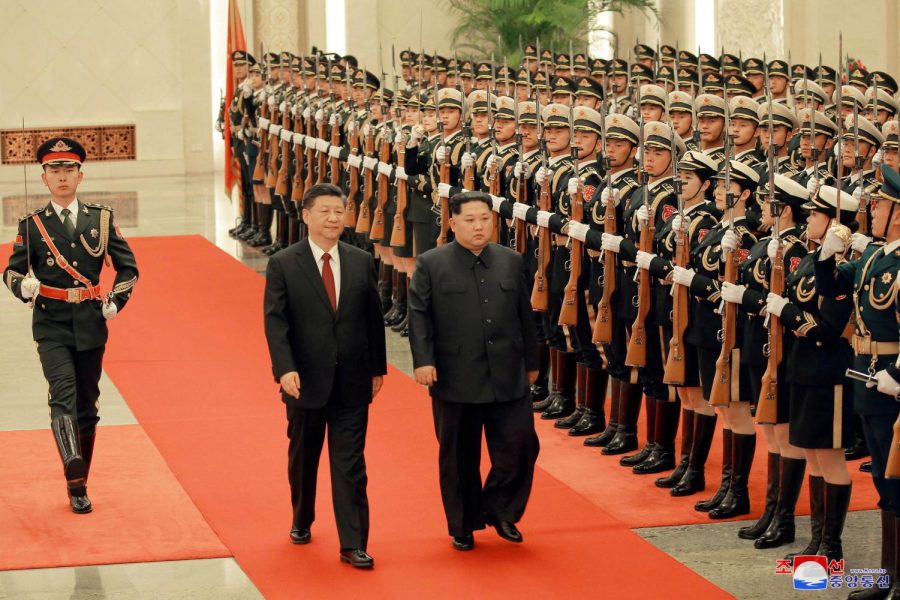Close Relationship Between China and North Korea is Cause for Concern
There are a lot of important events recently happening on the international stage, specifically involving North Korea. In mid-November, North Korea launched two intercontinental ballistic missiles (ICBMs) that flew into the waters west of Japan. This is the first missile North Korea has launched over another nation. This activity is a contrast from the last few years when missile launches and nuclear tests were put on pause due to the pandemic and meetings during Trump’s tenure.
At the same time, Chinese President Xi Jinping and the Chinese Communist Party (CCP) passed two constitutional amendments at the CCP meeting that gave him an unprecedented third term and paved the way for him to reign for an extended amount of time.
These recent events are important because the futures of these two countries are connected in a delicate dance. China is North Korea’s main trade partner, but with North Korea having access to the “Nuclear Weapons Club,” they are not just any old trade partner. While North Korea has been building up its nuclear arsenal for quite some time, China’s position in the world under the direction of Xi seems to be shifting toward gaining more power and threatening the United States’ position as a leading superpower in the world. The takeaway from these current events is that China is heading down its chosen path full steam ahead, and North Korea seems to be less and less willing to work with the United States to denuclearize. China’s continued rise to the top of the world food chain could lead to a deepening of the relationship between China and North Korea.
One way I could see this increased relationship occurring is through North Korea’s inclusion in a Chinese economic and foreign policy called the One Belt, One Road Initiative, known more colloquially as the Belt and Road Initiative (BRI). The BRI, launched in 2013, is an economic and foreign policy in which the Chinese government funds foreign infrastructure projects. However, it’s more than just Chinese banks writing checks for projects around the world. These deals also establish special economic zones and free trade. They are billed as a “modern-day Silk Road,” but these networks would benefit China more because they would increase their influence across the world, which could help them become a superpower over time. As China’s BRI expands and strengthens the country’s diplomatic connections around the world, these countries may be less swayed to compete for American interests. After all, it is difficult to switch paths and answer to the United States if you are paying back a lengthy debt to China.
This relates to North Korea because once the BRI networks have been solidified, North Korea could become a recipient of BRI infrastructure funds and join the extensive Chinese networks. This would benefit both states economically, especially North Korea because of the long-term financial impact of international sanctions. A deepened relationship would also benefit Chinese security because they would have better access to North Korean leaders to keep their nuclear program in control.
So why hasn’t this happened yet? Why is North Korea not already a member of the BRI network? I believe it’s because neither country has been in the right position to make it happen. China launched the BRI in 2013, so it will take time for these trade routes to be established and maintained. Xi has also only been in power since 2012, and if he was still making adjustments in 2022 to further solidify his control over the government, then the timing may not have been right to wade into the politics of bringing North Korea into the BRI. In addition, North Korea may not have been ready to completely turn its back on the West. Joining the BRI to spur its economy in spite of ongoing UN sanctions would be a complete and utter turn away from the Western-led world order. North Korean leader Kim Jong-Un was open to dialogue with the United States for denuclearization as recently as the Trump administration. It would take a shake-up of the unipolar world order for North Korea to join the BRI.
It seems, though, that the winds have changed. North Korea is continuing its nuclear activity and Xi is the definite leader of China. Clearly, China is confident it can force a bipolar world order with a Chinese sphere of influence and an American sphere of influence. A recent meeting between Xi and Kim is evidence that the relationship between their nations is headed in the direction of a world where Chinese interests are considered as important as American ones. Though I merely theorize as to how North Korea could move away from appeasing the West and toward China, no one can deny that our international politics are shifting.
Sarah Kenny, FCRH ’24, is a political science and history major from Seattle, Wash.










































































































































































































